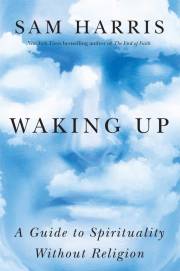 For the millions of Americans who want spirituality without religion, Sam HarrisÔÇÖs new book is a guide to meditation as a rational spiritual practice informed by neuroscience and psychology.
For the millions of Americans who want spirituality without religion, Sam HarrisÔÇÖs new book is a guide to meditation as a rational spiritual practice informed by neuroscience and psychology.
From Sam Harris, neuroscientist and author of numerous New York Times bestselling books, Waking Up is for the twenty percent of Americans who follow no religion but who suspect that important truths can be found in the experiences of such figures as Jesus, the Buddha, Lao Tzu, Rumi, and the other saints and sages of history. Throughout this book, Harris argues that there is more to understanding reality than science and secular culture generally allow, and that how we pay attention to the present moment largely determines the quality of our lives.
Waking Up is part seekerÔÇÖs memoir and part exploration of the scientific underpinnings of spirituality. No other book marries contemplative wisdom and modern science in this way, and no author other than Sam HarrisÔÇöa scientist, philosopher, and famous skepticÔÇöcould write it.
EDITORIAL REVIEWS
REVIEW
ÔÇ£A brief and forceful broadside at the conundrum that has nagged at every major thinker from Plato to Slavoj Zizek. Self-avowedly secular, [Harris is] addressing the need for individual growth and social betterment, and doing so with compelling argument and style.ÔÇØ ÔÇöLos Angeles TimesÔÇ£Harris skewers the concept of free will ÔÇö that mainstay of law, policy and politics ÔÇö in fewer than 100 pages.ÔÇØ ÔÇöNature
┬á“Brilliant and wittyÔÇöand never less than incisiveÔÇöFree Will shows that Sam Harris can say more in 13,000 words than most people do in 100,000.” ÔÇöOliver Sacks
ÔÇ£The most compelling strand in ÔÇ£The Moral LandscapeÔÇØ is its unspooling diatribe against relativism.ÔÇØ ÔÇöNew York Times
ÔÇ£This is an inspiring book, holding out as it does the possibility of a rational understanding of how to construct the good life with the aid of science, free from the accretions of religious superstition and cultural coercion.ÔÇØ ÔÇöFinancial Times
Harriss is a first-principle argument, backed by copious empirical evidence woven through a tightly reasoned narrative Harriss program of a science-based morality is a courageous one that I wholeheartedly endorse. Scientific American
ÔÇ£Sam Harris breathes intellectual fire into an ancient debate. Reading this thrilling, audacious book, you feel the ground shifting beneath your feet. Reason has never had a more passionate advocate.ÔÇØÔÇöIan McEwan
ÔÇ£I was one of those who had unthinkingly bought into the hectoring myth that science can say nothing about morals. To my surprise,┬áThe Moral Landscape┬áhas changed all that for me. It should change it for philosophers too. Philosophers of mind have already discovered that they can’t duck the study of neuroscience, and the best of them have raised their game as a result. ┬áSam Harris shows that the same should be true of moral philosophers, and it will turn their world exhilaratingly upside down. As for religion, and the preposterous idea that we need God to be good, nobody wields a sharper bayonet than Sam Harris.ÔÇØÔÇöRichard Dawkins
ÔÇ£Reading Sam Harris is like drinking water from a cool stream on a hot day. He has the rare ability to frame arguments that are not only stimulating, they are downright nourishingÔǪ His discussions will provoke secular liberals and religious conservatives alike, who jointly argue from different perspectives that there always will be an unbridgeable chasm between merely knowing what is and discerning what should be. As was the case with HarrisÔÇÖ previous books, readers are bound to come away with previously firm convictions about the world challenged, and a vital new awareness about the nature and value of science and reason in our lives.ÔÇØ ÔÇöLawrence M. Krauss, Foundation Professor and Director of the ASU Origins Project at Arizona State University, author of The Physics of Star Trek, and, Quantum Man: Richard FeynmanÔÇÖs Life in Science┬á
┬áÔÇ£A lively, provocative, and timely new look at one of the deepest problems in the world of ideas. Harris makes a powerful case for a morality that is based on human flourishing and thoroughly enmeshed with science and rationality. It is a tremendously appealing vision, and one that no thinking person can afford to ignore.ÔÇØ ÔÇöSteven Pinker, Harvard College Professor of Psychology, Harvard University, and author of How the Mind Works and The Blank Slate.
Expanding upon concepts posited in the End of Faith and Free Will, neuroscientist Harris draws from personal contemplative practice and a growing body of scientific research to argue that the self, the feeling that there is an I residing in ones head, is both an illusion and the primary cause of human suffering. The great value and novelty of this book is that Harris, in a simple but rigorous style, takes the middle way between pseudoscientific and pseudospiritual assertions, cogently maintaining that while such contemplative insights provide no evidence for metaphysical claims, they are available, and seeing them for ourselves leads to a profoundly more salubrious life. (Publishers Weekly)
ABOUT THE AUTHOR
Sam Harris is The Author of the Bestselling Books The End of Faith, Letter to a Christian Nation, The Moral Landscape, Free Will, andLying. The End of Faith won the 2005 PEN Award for Nonfiction. His writing has been published in over fifteen languages. Dr. Harris is cofounder and CEO of Project Reason, a nonprofit foundation devoted to spreading scientific knowledge and secular values in society. He received a degree in philosophy from Stanford University and a PhD in neuroscience from UCLA. Please visit his website at SamHarris.org.
